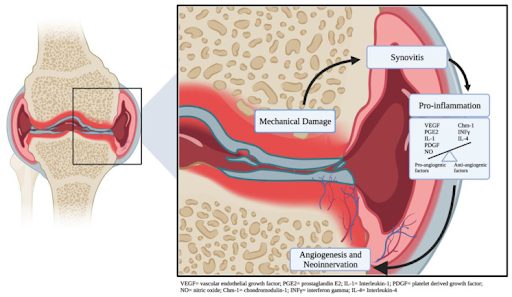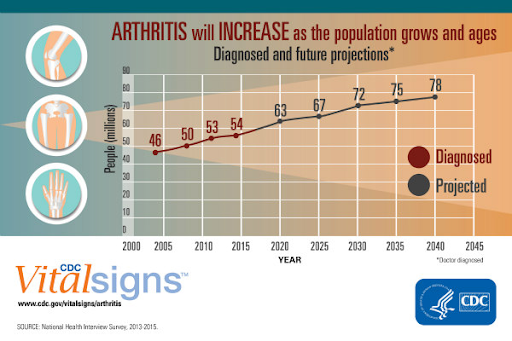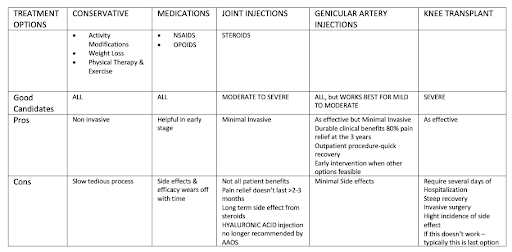Proudly Part of Privia Health
Genicular artery embolization (GAE)
Problem Solving
- What is Knee Osteoarthritis (OA)?
- What are the symptoms of Knee Osteoarthritis (OA)?
- How is Knee Osteoarthritis (OA)diagnosed?
- What is the Prevalence, demographics and risk factors for Knee Osteoarthritis (OA)?
Prioritize Counseling
- What if I ignore the symptoms of Knee Osteoarthritis (OA)? What are the complications of Knee Osteoarthritis (OA)?
- How knee osteoarthritis is treated?
- What is knee embolization or Genicular artery embolization?
- Is Genicular Artery Embolization (GAE), a minimally invasive procedure?
- Who is a good candidate for Genicular Artery Embolization (GAE)?
- How should I prepare before the Genicular Artery Embolization (GAE) procedure?
- How does Dr. Patel (Interventional Radiologist (IR)) treat Knee Osteoarthritis (OA)? How Genicular Artery Embolization (GAE) procedure performed?
- What happens when you embolize Geniculate arteries?
- How long does the Genicular Artery Embolization (GAE) procedure takes?
- What recovery looks like after Genicular Artery Embolization (GAE)?
- What kind of follow-up care is typical after Genicular Artery Embolization (GAE)?
Patient Safety
- Is Genicular Artery Embolization (GAE) safe? What are the side effects of Genicular Artery Embolization (GAE)?
- What are the common complications that are specifically related to Total Knee Replacement but not with Genicular Artery Embolization (GAE)?
- Is Genicular Artery Embolization (GAE) better than Surgical options? Is Genicular Artery Embolization (GAE) better than Total Knee Replacement?
Personalized Care
- Have other treatments failed, leading you to believe surgery is the only option left?
- Are You Dreading surgical treatment options?
- What are the different treatment options available?
- What is unique about Dr. Patel’s approach toward Knee pain? Am I a good candidate for Genicular artery embolization procedure?
- What are some unique advantages of Genicular Artery Embolization (GAE) as compared to other surgical options?
- How effective is Geniculate Artery Embolization?
- When Genicular Artery Embolization (GAE) is a superior treatment option? And how come I haven’t heard about the Genicular Artery Embolization (GAE) procedure?
- What are other indications for the Genicular Artery Embolization (GAE) procedure?
- How can Knee Osteoarthritis (OA) be prevented?
Quality Of Life
- Does Knee Osteoarthritis (OA) limit your quality of your life?
- What is the ultimate Goal?
Problem Solving
What is Knee Osteoarthritis (OA)?
Osteoarthritis (OA) is the most common form of arthritis. Also known as degenerative joint disease.
Old school belief: Knee OA occurs as “wear and tear” arthritis. However, recent scientific research suggests this is a direct result of synovial inflammation(increased blood flow) releasing a chemical in the knee joint leads to further destruction of the joint. The inflammation likely contributes to the degeneration of the joint.

With OA, the cartilage within a joint begins to break down and the underlying bone begins to change. Resulting in pain symptoms.
What are the symptoms of Knee Osteoarthritis (OA)?
Most common symptoms are debilitating knee pain and stiffness. Symptomatic Knee OA changes usually develop slowly and get worse over time. OA can also cause swelling and gait changes, and decrease morale and quality of life due to reduced function and disability; some people are no longer able to do daily tasks or work.
How is Knee Osteoarthritis (OA) diagnosed?
A doctor diagnoses OA through a review of symptoms, physical examination, X-rays, and lab tests.
What is the prevalence, demographics and risk factors for Knee Osteoarthritis (OA)?
Numbers are eye-popping!!
- Knee OA will affect 50% of Americans during their lifetime.
-
MORE THAN 1/3 OF Americans older than 60 years of age will experience chronic pain from knee OA.

Risk factors are as follows:
- Joint injury or overuse—Injury or overuse, such as knee bending and repetitive stress on a joint, can damage a joint and increase the risk of OA in that joint.
- Age—The risk of developing OA increases with age.
- Gender—Women are more likely to develop OA than men, especially after age 50.
- Obesity—Extra weight puts more stress on joints, particularly weight-bearing joints like the hips and knees. This stress increases the risk of OA in that joint. Obesity may also have metabolic effects that increase the risk of OA.
- Genetics—People who have family members with OA are more likely to develop OA. People who have hand OA are more likely to develop knee OA.
- Race— Some Asian populations have a lower risk for OA.
Prioritize Counseling, Information is the key.
What if I ignore the symptoms of Knee Osteoarthritis (OA)? What are the complications of Knee Osteoarthritis (OA)?
You will be at risk of complications such as
- Bone Death
- Stress Fracture
- Bleeding or Infection in Joint
- Deterioration of tendons and ligaments around the joint
- Chronic pain that can be exhausting and debilitating
- Anxiety & Depression
- 2.5 times more likely to experience a fall or injury
- Work limitations
- Weight gain
- Sleep disruption
- Reduced Productivity
How Knee Osteoarthritis is treated?
Treatment options may include
- lifestyle changes
- Medications
- Minimally invasive procedures
- More invasive surgery
A health care provider treats Knee Osteoarthritis based on the severity of symptoms, chronicity symptoms, assess the response to conservative treatment, how much the symptoms affect a daily life, and a patient’s preferences.
Patient may not need an aggressive treatment for a mild disease unless their symptoms are bothersome and affect their quality of life. Dr. Patel fundamentally believes in conservative or lease invasive procedure over open surgery. Dr. Patel initially recommends less invasive options to begin with while keeping more aggressive options for later phase as need arise.
What is a knee embolization or Genicular artery embolization (GAE)?
This is a cutting-edge, innovative procedure directed towards decreasing inflammation to the knee joint via reducing the blood supply to the lining of the knee which in turn relieves aching and stiffness from knee osteoarthritis.
Is Genicular artery embolization (GAE) a minimally invasive procedure?
Yes. Unlike an invasive knee replacement surgery, Dr. Patel, an experienced Interventional Radiologist, performs an image-guided outpatient procedure avoiding knee replacement surgery while pausing knee Osteoarthritis, which controls symptoms and significantly improves and restores quality of life. Isn’t this amazing! Approximately 8 out of 10 women who undergo GAE will experience significant improvement even the 3 years after the procedure.
Who is a good candidate for Geniculate artery embolization (GAE)?
GAE is a non-surgical treatment alternative for patient with persistent moderate to severe Knee pain limiting quality of life who have failed or less benefited from conservative therapy.
GAE can provide an effective alternative to conventional surgery.
Dr. Patel will meet with you to review your medical history and imaging studies. Together, we will help you to determine whether GAE is right for you.
How should I prepare before the GAE procedure?
Some medications should be stopped or reduced – you should discuss your medications with your doctor. You should fast for at least 6 hours before the procedure, though water can be taken with your normal medications. Before the intervention, you will receive some antibiotics to prevent infection.
How does Dr. Patel (Interventional Radiologist (IR)) treat Knee Pain with the Genicular artery embolization procedure?
For a better understanding, let’s start with the concept. Knee pain/stiffness occurs from synovial inflammation (cell lining the knee joint). Inflammation thrives on extra blood supply. and additional blood supply promotes the growth of synovial membranes that release chemicals in the knee joint which in turn damages more tissue and results in more inflammation – pain – stiffness. This is a vicious cycle.
How do you break this cycle? The underlying principle is to cut off the blood supply (for oxygen and nutrients) via Genicular arteries. This results in less synovial growth- less chemical release in the knee joint – less inflammation – significant pain release – less stiffness – better growth – prevent further joint damage.
Under X-ray guidance and sedation, Dr. Patel accesses the artery in the leg/wrist/groin through a small incision, the size of a rice grain. Dr. Patel then guides a very thin catheter (about the size of a strand of spaghetti) into the incision and through your blood vessels to the Genicular arteries supplying blood to the bad synovium(inner lining of the knee joint). Once the catheter is in the proper position, Dr. Patel releases small particles (like tiny sands) at the targeted location to block the small vessels and deprive the inflamed synovium of nutrients. When embolization is completed, the catheter is removed, and pressure is applied to the small incision to allow it to heal.
What happens when you Embolize Genicular arteries?
By cutting off the blood supply to an inflamed synovium, it disrupts the vicious cycle of inflammation – hypertrophy (overgrowth/over function) – Intraarticular (within knee joint) Chemical release – further destruction of the joint. This immediately pauses further joint inflammation-related knee arthritis(destruction) changes.
How long does the GAE procedure takes?
This outpatient procedure takes around 1 hours and the patient will return home later that day.
What recovery looks like after Genicular artery embolization?
Can resume normal daily activities past 3 days of the GAE.
What kind of follow-up care is typical after Genicular artery embolization?
Patient follow-ups are 2 weeks, 2 months, 6 months, and 1 & 3 years after the procedure.
Patient Safety is the Paramount goal.
Is Genicular Artery Embolization (GAE) safe? What are the side effects of Genicular Artery Embolization (GAE)?
Much less frequent & less severe than invasive surgery.
Minimal or no significant post-procedure problems. The most common issues were transient mild knee pain, self-limited numbness, and skin discoloration of the knee, as well as bruising at the puncture site. But most of the time “all symptoms resolved over time,”
What are the common complications that are specifically related to Total Knee Replacement but not with Genicular Artery Embolization (GAE)?
For older adults, however, the risk of complications was more than double.
Infection
Bleeding and wound complications
Blood clots
Persistent pain and dis-satisfaction
Allergy to foreign body metal component
Implant loosening/periprosthetic fracture
Knee stiffness and loss of motion
Painful recovery
Nerve injury
Complications related to anesthesia
The potential benefits of Geniculate artery embolization compared with surgery are much fewer complications, faster recovery and you can have this procedure as an outpatient.
Is Genicular Artery Embolization (GAE) better than Surgical options? Is Genicular Artery Embolization (GAE) better than Total Knee Replacement?
GAE is a newer, faster, safer, minimally invasive treatment and an easier way to relieve the symptoms caused by Knee osteoarthritis. As compared to Total Knee replacement, GAE is outpatient procedure, Shorter Recovery time, Low risk of serious side effects. Total knee replacement is Irreversible surgery, and implant has a sort of life expectancy and when is it fails there are very few options available. As opposed, GAE doesn’t preclude any treatment options later on and easily repeatable without putting patient under significant risks.
Personalized Care
Have other treatments failed, leading you to believe surgery is the only option left?
Know the evidence, Proven Efficacy & Avoid the Hospital.
Are You Dreading surgical treatment options?
There are plenty of reasons to be hesitant or skeptical. Our only goal is to help you to make an informed decision regarding your care in Personalized manner.
What are the different treatment options available?

What is unique about Dr. Patel’s approach toward Knee pain? Am I a good candidate for Genicular artery embolization procedure?
Dr. Patel, an Interventional Radiologist, assesses, diagnose & evaluates every patient in a unique situation. Depending on the severity of the disease, Dr. Patel offers different management solutions.
Suppose you are suffering from persistent moderate to severe knee pain resistant to your ongoing conservative therapy, In that case, you may benefit from this novel minimal invasive GAE procedure (relieves knee pain without knee replacement surgery). Discuss your case with Dr. Patel & find out what is best treatment options suit you.
If you are willing to undergo knee replacement surgery for severe knee pain osteoarthritis or debilitating knee pain, & if you are interested in avoiding surgery & becoming symptoms-free, you may benefit from GAE.
What are some unique advantages of Geniculate artery embolization (PAE) as compared to other surgical options?
GAE is
- Versatile: Most patient will benefit
- Succeeds when other technique fails
- Quick and swift recovery
- Can Discontinue medical therapy
- Very strong safety Profile
- Outpatient Minimal invasive procedure
- Does not preclude surgery later
- Can repeat
How effective is Genicular artery embolization?
Judge yourself. We are more than happy to answer any questions or concerns in order to make an informed decision. Approximately 8 out of 10 women who undergo GAE will experience significant improvement even the 3 years after the procedure.
Baseline pain (visual analog scale [VAS] pain score) and symptom scores (Western Ontario and McMaster Universities Osteoarthritis Index [WOMAC]) were assessed. This is compared at the follow-up to access clinical benefits in terms of symptomatic knee osteoarthritis (associated knee pain).
When Geniculate artery embolization is a superior treatment option? And how come I haven’t heard about the GAE procedure?
You are not alone.
Unfortunately, this technique is unique, difficult to reproducible in term of outcomes and safety, that has not been popularized yet require additional skillset and only available at few novel centers of excellence.
Due to a lack of knowledge, most of the patients either receive conservative therapy, physical therapy, or total Knee replacement surgery.
Given Dr. Patel’s far-reaching knowledge, approach and experience, this is now offered in Space Coast area.
What are other indications for the Geniculate artery embolization procedure?
Apart from the most common indication for Knee Osteoarthritis, is indicated in Hemarthrosis (Bleeding in the joint) or to control bleeding after Total knee replacement.
How can Knee Osteoarthritis be prevented?
You can’t fully prevent OA. But you can help lessen daily stress on your joints. This can make it less likely that OA will happen, or get worse.
- Taking good care of yourself can help prevent joint problems.
- Keep a healthy body weight: Extra weight puts stress on your joints. It can most hurt your hips, knees, ankles and feet. And extra fat causes changes in the cartilage. If you are overweight, talk with your healthcare provider about safe ways to lose weight.
- Control your blood sugar: High blood sugar levels raise your risk of getting OA. If you have diabetes, get your blood sugar levels checked regularly. Talk with your healthcare provider about ways to manage your levels if they are too high.
- Exercise: Avoid exercise that puts strain on your joints and forces them to bear an excessive load, such as running and weight training. Instead, try exercises such as swimming and cycling, where the strain on your joints is more controlled.
- Posture: It can also help to maintain good posture at all times and avoid staying in the same position for too long.
- Pay attention to pain: If you suffer from persistent 1-2 hours of pain from regular day to day work/exercise, then you may benefits from conservative treatment such as physiotherapy.
Quality Of Life
Does Knee Osteoarthritis limit your quality of your life?
- Do you avoid activities because of pain & stiffness related to knee OA?
- Do you feel restricted or limits your quality-of-life attribute to Knee OA?
- Do you consider your weight gain and sleep disturbance attribute to your Knee OA related?
- Do you feel your conservative treatments are not able to offer significant pain relieve?
- Do you want avoid or not a candidate or dreading about Total Knee Replacement?
If any of above is true, then We can help you improve your Quality of Life! We NEVER do surgery and can show you options that can work for you.
What is the ultimate Goal?
An ultimate goal for DR. Patel is that an impact of any and all medical interventions significantly improves overall well-being, including physical, emotional, social, and psychological aspects of their quality of life without compromising patient safety.
